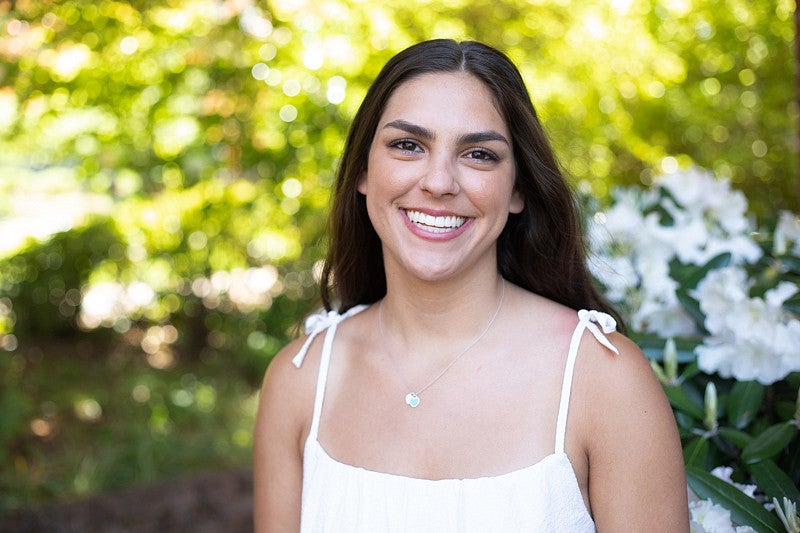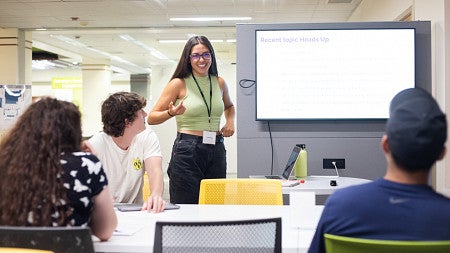Megan Rangel-Lynch: Environmentalism, inclusivity and service to community

Favorite CHC class: "The (Ir)Relevance of Law" with Alison Gash
Favorite study spot: Table by the window in the Law Library
Graduation walk-up song: "I’m Good (Blue)" by David Guetta, Bebe Rexha
Biggest supporter: My two moms, Marcy Rangel and Becky Lynch, and my roommate and friend Natasha Eberle
Advice for CHC students: Take advantage of the small class sizes. Even if it’s not your usual style, get to know your classmates! They are some amazing human beings doing really unique things at this university.
Megan Rangel-Lynch remembers showing up at the University of Oregon for a Duck Days admissions tour after applying a high school senior. She was the only student who showed up.
Rather than wonder why other students weren’t attending, Rangel-Lynch took advantage of the opportunity and considered the day as her exclusive tour. It allowed her to see one of her top choices, explore the university solo and ask any question that came to mind. And she took it as a sign. “It was some kind of writing on the wall of like this is where I want to be,” she says now.
Rangel-Lynch will graduate from the Clark Honors College with a degree in environmental studies, and a double minor in ethnic studies and nonprofit administration. Her experience has led her down a path that mixes her passion for environmentalism, cultural representation, and community service.
“To me, no issue is an issue without people involved,” Rangel-Lynch says. “I am really interested in the way the environment interacts with humans and how it shapes public policy and social customs.”
Her choice of studies aligns perfectly with her passions. “As a biracial student at a predominantly white university, that pushed me into the ethnic studies minor because I wanted to learn a more about not only my own identity, but other identities, and the structural and systemic barriers that create inequities,” she says.
“That pushed me into the ethnic studies minor; wanting to learn more not only about my own identity, but other identities, and the structural and systemic barriers that create inequities,” she says.
Her journey through ethnic studies, in part, served as the thread that connected her academic passions to her drive to make a difference wherever she can. She doesn’t shrink in the face of things like climate change and environmental racism. While some in her generation get overwhelmed by the future, she looks at it differently. “I am definitely an optimist,” she says. “I am fully pro ‘individual action.’”
One of her most influential classes was an introductory class about natural resource policy, which delved into various environmental policy acts, including the National Environmental Policy Act and the Clean Water Act. She enjoyed how the class blended an introduction to the public policy aspect of environmental science with an eye to creating change by rewriting policies that aren’t in the best interest of a community.
In her first year, she joined the Environmental Leaders Academic Residential Community, sharing a dorm floor for students who have a passion for environmental studies. “It was really cool to have an introduction to a topic where everyone cares,” she says.
Rangel-Lynch bonded with the other students on her floor by taking the same classes together, as well as going on outdoor excursions. “Four days before school started, I went on a trip with some other ARC students, and we biked 60 miles. We really got to know our group of hallmates through this exciting and fun experience,” she recalls. “I met some of my best friends in that ARC.”
As a junior, Rangel-Lynch traveled abroad to Belize as part of Wildlands, an environmental studies program affiliated with Western Washington University. For six weeks, she worked alongside seven other college students as they learned about the significance of protected lands and the principles of how to sustainably manage them.
During a segment of the trip, the students stayed in tents near one of Belize’s Creole villages. Near the village, she says, lies a range of limestone-dominated mountains, which attracted the interest of a U.S. international corporation as a potential mining spot.
The students learned that the corporation’s mining efforts – if approved – would destroy habitat crucial to a number of endangered species. Rangel-Lynch says students were told the company wanted to also dredge an entire coastline nearby to accommodate the entry and exit of ships.
It all left a lasting impact on Rangel-Lynch.
“I came back in a minor crisis; it was a hard transition because I was like, ‘Why am I reading about this? We need to take action other than just reading about problems,’” she remembers thinking.
In talking with friends and family, she realized the best way to take action would be to stay informed about the area, earn her degree, and find a job that will put her in a position to advocate for communities at risk of being affected by adversity.

After returning from Belize, Rangel-Lynch jumped into her work on her Honors College thesis, which focuses on guiding government officials on ways to cultivate space in U.S. forest management for underrepresented communities and tribal nations.
Rangel-Lynch worked with Sarah Wald, an environmental studies associate professor, who was also her thesis advisor.
“She brings a passion for building a world that addresses some real violences that have taken place in relationship to public lands and environmentalism,” says Wald. “She's interested in thinking about how we work towards not just an inclusive future, but how do we use the knowledge we have about the past to undue systems of harm.”
Wald connected Rangel-Lynch with Bark, a forest advocacy organization that works to preserve and restore Mt. Hood National Forest in Oregon. She spent the summer doing research for them, while reviewing different forest management plans as part of her thesis. The plan proposed improvements to the U.S. Forest Service approach to identifying gaps around inclusivity.
“Nature has been created for this dominant, white male elite space and certain people are being left out of the outdoors,” says Rangel-Lynch.
During her thesis research, Rangel-Lynch found that none of the Forest Service plans included community engagement in public spaces. One of her recommendations was to establish a dedicated position focused on engaging underrepresented communities in locations where people typically frequent, such as grocery stores. “People who are undocumented may feel uncomfortable going to (government offices) and participating in these more formal open houses and comment periods,” she says.
With her thesis completed, Rangel-Lynch has been savoring the final days of her last term at CHC, cherishing time with friends, enjoying the outdoors and looking ahead.
In late June, she’ll go into the forests of Southern Oregon, working on a trail-restoration project to preserve public access to natural spaces. After that, she wants to spend some time traveling the world and seeking new experiences. Then she hopes to find a job where she can make a tangible difference.
Whether that involves working for a prominent corporation to drive internal change or engaging in political environmental advocacy, nothing for her is set in stone. “My passion is going to take me into more community-based organizations; that’s always where I have seen myself,” she says. “For me, it’s doing something tangible, doing something that even if it’s long term I can see some results and see some impact,” she says.
- Story by Bella Oberlatz, Clark Honors College Communications
- Photo by Ilka Sankari, Clark Honors College Communications
